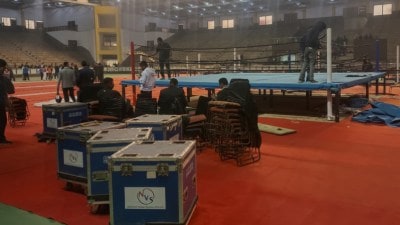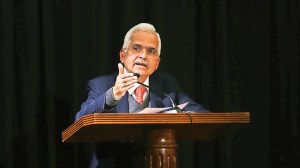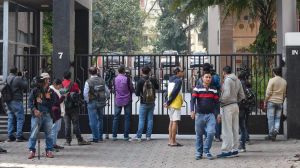Can we bridge this Gulf?
In the complex world of today, is it realistic to ask that the Gulf region be a nuclear weapon-free zone? If so, why? After all, the proposa...

In the complex world of today, is it realistic to ask that the Gulf region be a nuclear weapon-free zone? If so, why? After all, the proposal for a larger Middle East as a Weapons of Mass Destruction WMD Free Zone has not moved at all for the simple reason that the Arab states did not want to forego their right to possess chemical weapons as long as Israel possesses nuclear weapons. Iran under the Shah put forward a proposal for the Middle East as a nuclear weapon free zone in 1974 which in due course was expanded into the WMD-free zone proposal. The Gulf region can only be a subset of the broader construct of the Middle East WMD Free Zone. And given the hype about Iran8217;s nuclear programme during the past two years, it is obvious that any suggestion to narrow the scope from the broader Middle East to the Gulf region would have Iran as the focal point.
Track-II diplomacy has acquired many forms and nuances in recent years. In what was a sophisticated effort to address the issue of Gulf security, the Dubai-based Gulf Research Centre, a non-governmental think tank, organised an international workshop earlier this month under the title 8216;Voice from the Region8217; on the esoteric theme of the Gulf as a WMD-Free Zone. The actual dialogue remained centred on the nuclear issue while the other two categories of WMD were seen as less critical. Experts and policy-makers from countries from the region, from India to Iraq, participated along with a large group of European not American experts on various aspects of the issues. Interestingly, the majority of participants spoke up on behalf of Iran with many European experts arguing that Iran had not violated any of the non-proliferation rules and commitments it was legally obliged to follow.
The obvious question that arises is that since, unlike the broader Middle East region, all the Gulf countries are members of the NPT as non-nuclear weapon states, why would a nuclear weapon free zone be sought? To begin with, there was broad consensus that the NPT, and the non-proliferation regime spawned by it, is under severe stress. This left the issue of nuclear proliferation from Pakistan un-stated while the risks of NPT member countries withdrawing from the treaty and possibly going nuclear were recognised. With the NPT Review Conference coming up in May next year at the UN, this anxiety could spin out of control into a major politico-diplomatic imbroglio for the NPT member states since no progress has been made on the 13 steps agreed upon at the first review conference in 2000 after the permanent extension of the NPT, leave alone the earlier demands and commitments to nuclear disarmament. This has only been made worse by the denial of access to nuclear technology for peaceful purposes and the pressures being brought to bear on Iran, and even on the head of IAEA, who is not willing to confirm violations without adequate evidence. Most non-American experts believe that Iran has not violated its NPT obligations.
Many European experts were sympathetic to Iranian concerns arising from Israel8217;s nuclear status; many believed Iran was not being treated 8220;fairly.8221; This, then, creates the need for additional measures, of which a WMD Free Zone in the Gulf is one; a better regional security structure would be another. All participants were conscious that the former made the proposal Iran-centric. This, in turn, would no doubt increase Iran8217;s negotiating leverage with the attendant potential of strengthening the conservative nationalism which has already gained ground as a consequence of American and other western pressures.
There was a view that with Iraq8217;s de-nuclearisation, the threat to Iran had disappeared. This, in turn, provided scope for focusing on what was termed as the 8220;only8221; threat, that is, Israel. Iran, no doubt, would be willing to seriously discuss a Gulf WMD Free Zone, but within the context of the broader Middle East WMD Free Zone along with the withdrawal of extra-regional military forces from the region and the evolution of a cooperative security framework in the region by the states of the region without military alliances with extra-regional states. The hurdles on this path are obvious.
The workshop also made it abundantly clear that there were deep concerns about US/Israeli threats to use force against Iran. This could then lead to the expansion of risks and dangers in the region with unanticipated consequences. These could range from Chernobyl type radiation hazards as a consequence of possible strikes on Iranian nuclear facilities to the willy-nilly involvement of GCC countries in such a conflict. In turn, this would impact on Indian and Pakistani interests in view of the large expatriate population in the GCC countries even though India does not pose a problem in view of its declared policy of no-first-use and, equally important, its commitment not to use nuclear weapons against a non-nuclear weapon state.
It is obvious that the time is ripe for a review of the security of the Gulf region. The initiative by the Gulf Research Centre in discussing the novel approach to the Gulf as a WMD Free Zone may appear idealistic. But it will have served a key purpose if it helps to focus on the security challenges in the Gulf which have acquired new dimensions during the past three years after the US-led war in Afghanistan followed by the Iraq War. It would be wise to situate specific issues and proposals like the WMD free zones in the broader context of cooperative security which would have to be inclusive if it is to achieve a modicum of success. A great deal of intellectual capital needs to be invested in working out the modalities and nuances of achieving such a goal. It may also be useful to study the ASEAN approach and that of other regional security forums in Asia for possible lessons for working toward cooperative security in the Gulf and its adjoining region.
- 01
- 02
- 03
- 04
- 05































